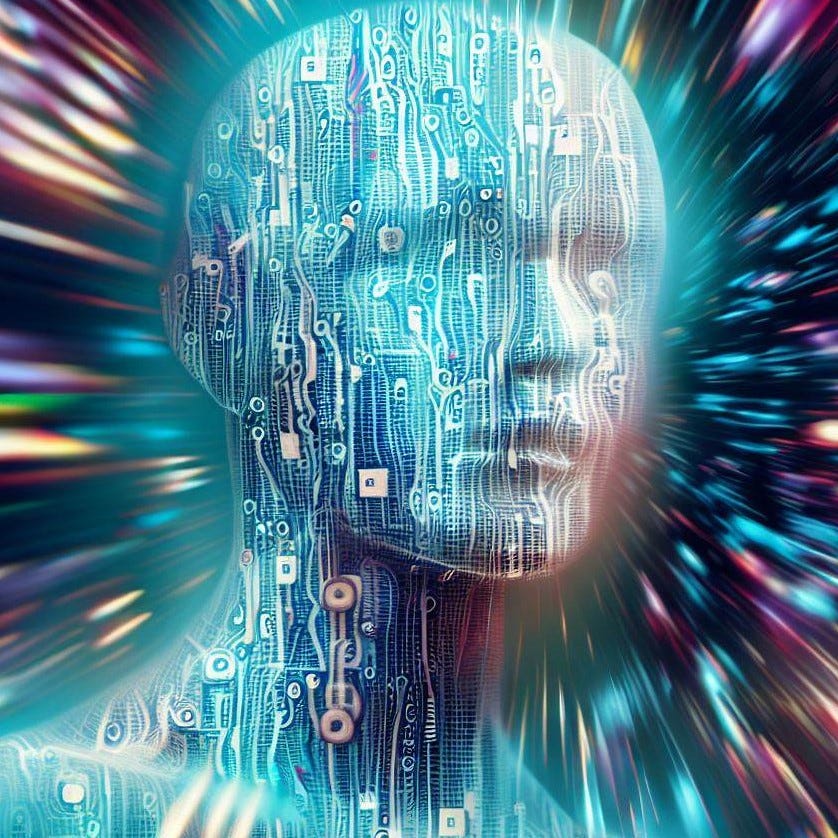Holistic System Thinking for Bio-Tech Integration: Data Mining, Information Theory, and Consciousness
Exploring the boundaries for information, between biology and technology for a holistic and sustainable interaction.
In the vast realm of the digital age, philosophy and system thinking holds great significance within the interplay between technology and biology in the context of data mining, information theory, feedback loops and quantisation. I aim to explore the profound implications of these concepts and their interconnectedness, shedding light on how they shape our understanding of complex systems and offer insights into the ever-evolving landscape of information and knowledge.
Data mining: Quantisation, Information Theory, and sustainable Bio-Tech Integration
Data mining refers to the process of extracting valuable insights, patterns, and knowledge from vast volumes of data. With the exponential growth of digital information, data mining techniques have become essential tools for uncovering hidden relationships and extracting valuable intelligence. Quantisation, a fundamental concept in physics, involves the discretization of physical quantities, such as energy or information. In the context of information theory, quantisation enables the representation and transmission of data in a discrete form, allowing for efficient encoding, compression, and storage. It empowers us to harness the power of discrete information and explore new possibilities in data-driven innovation.
Information Theory and Bio-Tech Integration
Information theory provides a framework for understanding the fundamental principles of information, communication, and computation. It enables us to quantify and measure the amount of information contained within a dataset, allowing us to assess its relevance and significance. As we delve deeper into the integration of bio-technology and information systems, information theory plays a crucial role in unravelling the fabric of reality. By harnessing concepts like entropy, channel capacity, and coding theory, information theory facilitates efficient data processing, compression, and transmission. These advancements have far-reaching implications in fields such as telecommunications, cryptography, and machine learning, empowering systems to automate tasks, integrate with biological systems, and extract valuable insights from complex data.
The integration of bio-technology, including genetic engineering, synthetic biology, and bioinformatics, with information systems marks a profound paradigm shift in the way we approach healthcare, agriculture, and environmental sustainability. This practice allows us to make informed decisions, discover new opportunities, and gain deeper understanding from the ever-expanding digital ocean of information. By quantifying and analysing the flow of information within biological systems, we gain insights into the complexities of life itself. Information theory offers a lens to explore the intricate mechanisms of genetic coding, neural networks, paving the way for advancements in personalized medicine, neurobiology, and biotechnology and possibly psychology.
Biological vs. Digital Feedback Mechanisms
Feedback loops play a crucial role in understanding and modelling complex systems. Through feedback, systems can continuously adjust their behavior based on past experiences and outcomes, enabling them to self-correct, optimize performance, and evolve over time. By analysing feedback loops within biological systems, we can unravel the intricate dynamics that govern their functioning, identifying patterns, causal relationships, and emergent behaviours. In the realm of data mining and information theory, feedback loops assume a central role in iterative learning and adaptation.
By analysing feedback loops, we can identify patterns, causal relationships, and emergent behaviours, unravelling the intricate dynamics that underpin the functioning of complex systems. These loops enable systems to adjust their behavior based on past experiences and outcomes, allowing them to self-correct, optimize performance, and evolve over time. By analysing feedback loops within biological systems, we gain insights into the complex dynamics that govern their functioning, uncovering patterns, causal relationships, and emergent behaviours and the systems shaping their behaviour.
Sustainable Bio-Tech Integration
The integration of feedback loops and information theory within bio-tech systems further fuels automation and precision. Biological systems, with their capacity to adapt and respond to real-time feedback, can be harnessed to enhance efficiency, accuracy, and control. Expanding feedback loops to integrate biological systems with machine learning algorithms enables the extraction of meaningful insights from intricate biological data. By leveraging feedback, machine learning algorithms can continuously refine their models, improve predictions, and optimize performance in response to new information. This synergy between biological and technological components fosters a symbiotic relationship, augmenting the capabilities of both domains and paving the way for transformative advancements in areas such as diagnostics, drug discovery, and treatment optimization.
The integration of feedback loops and information theory in bio-tech systems promotes automation, as biological systems can adapt and respond to feedback in real-time, allowing for improved efficiency, precision, and control. Expanding the Feedback loops that facilitate the integration of biological systems with machine learning algorithms, enables the extraction of meaningful insights from complex biological data while adapting form the learning algorithms themselves. By leveraging feedback, machine learning algorithms can adapt their models, refine predictions, and optimize performance in response to new information, leading to more accurate and personalized outcomes in areas such as diagnostics, drug discovery, and treatment optimization. This integration also opens avenues for seamless interactions between biological and technological components, fostering a symbiotic relationship that enhances the capabilities of both domains.
Vedanta Philosophy: Bridging the Scientific and Spiritual Realms in Digital systems
Advaita Vedanta, an ancient philosophical tradition originating in India, offers a profound perspective on the interconnectedness of knowledge, consciousness, and reality. Rooted in the understanding that all experiences and knowledge emerge from a unified source, it even transcends the limitations of the physical world. In the context of data mining, information theory, and boundary separation between nature and machines, it encourages us to recognize the inherent interconnectedness of information, unveiling the underlying unity and interdependence of seemingly disparate datasets and domains of knowledge.
Vedanta, a philosophy integrated with science
Advaita Vedanta offers insights that harmonize scientific exploration with philosophical perspectives. It emphasizes the interconnectedness of all existence, recognizing the underlying unity that permeates the diverse manifestations in the world. Drawing from Vedanta's concepts of evolution, we can view digital systems and information as dynamic entities that undergo continuous growth and development with emergent potential. Just as life evolves, information systems also evolve through the accumulation and transformation of data, algorithms, and user and systemic interactions. The process of evolution within digital systems enables the emergence of novel capabilities, increased complexity, and the potential for transformative innovations.
Vedanta encourages a holistic approach to scientific inquiry, where the pursuit of knowledge is guided by a deeper understanding of the fundamental principles of existence. By integrating Vedantic insights, scientists can approach their work with a sense of reverence for nature's simplicity, interconnectedness, and inherent wisdom. In contrast to the outward evolution of information systems, Vedanta further introduces the concept of involution. Involution refers to the journey inward, delving into the essence of existence and the core principles that underpin the digital realm, the fundamental reality driving all the systems. Applied to information systems, involution invites us to reflect on the fundamental purpose and values that drive technological development.
“The essence of what truly matters is a profound clarity that is painstakingly achieved through simplicity.”
System thinking: Involution and evolution based practices
In parallel, system thinking provides us with a holistic framework to comprehend and manage complex systems throughout their lifecycle. By exploring the interrelationships between various components, feedback loops, and emergent behaviours, system thinking empowers us to navigate the intricate landscape of the digital realm and the vast web of interconnected information. By embracing Vedantic principles within the realms of data mining and information theory, we gain a deeper understanding of the nature of reality and the interconnectedness of information. The boundaries that separate the physical and digital worlds begin to dissolve, unveiling a more comprehensive perspective on the fabric of existence. Vedanta enriches scientific understanding by providing a broader framework that encompasses the spiritual, philosophical, and ethical dimensions of scientific exploration.
Evolutionary thinking prompts us to anticipate and adapt to changing user needs, leveraging advancements in data analytics, artificial intelligence, and user-centered design to create more intuitive and personalized experiences. Involutionary thinking encourages us to contemplate the ethical implications of technology, fostering a culture of responsible innovation and addressing potential biases, unintended consequences, and the impact on individual well-being. It invites scientists to delve beyond the material aspects of nature and contemplate the deeper significance and interconnectedness of their research. When applying Vedantic concepts logically within information systems, we can consider how evolution and involution can guide the development and deployment of technology.
This encourages us to explore the ethical, moral, and cultural dimensions of digital systems and their impact on individuals and society integrating values and responsibility into the Lifecycle. By incorporating culturally driven values, we can create systems that respect cultural diversity, ensure data sovereignty, and prioritize the collective welfare of communities. With the amalgamation of Vedanta, data mining, information theory, and system thinking, we develop an enriched perspective on the interplay between the digital and spiritual realms. By integrating Vedantic principles such as unity, interconnectedness, and reverence for life, scientists can cultivate a more holistic and responsible approach to their work, promoting a greater alignment with ethical considerations and the well-being of all beings. It fosters a comprehensive understanding of the world we inhabit and our role within it.
Exploring Paradigm Shifts: Information Systems, Bio-Tech Integration, and Consciousness Exploration
The integration of biology and technology in bio-tech challenges traditional notions of technology, leading to paradigm shifts in our understanding. It blurs the boundaries between artificial and natural systems, prompting us to view technology as an extension of living organisms rather than a separate entity. Through the process of evolution, systems undergo gradual changes and adaptations over time, driven by systemic variations, environmental constraints, and natural selection. This dynamic interplay fosters the emergence of diverse life forms, technologies, and ecosystems, each with its unique set of characteristics and capabilities. While evolutionary dynamics contribute to the richness and diversity of existence, understanding them provides a foundation for the exploration and understanding of the underlying reality.
Brahman: The Fundamental Cosmic Reality,
In the Vedantic perspective, the underlying reality that enables and sustains the diverse manifestations in the world is seen as an interconnected unity. While the world appears diverse and multifaceted, there is an underlying substratum that unifies everything. Recognizing this underlying unity helps us appreciate the interdependence and interconnectedness of all systems, fostering a holistic perspective that transcends apparent boundaries and divisions. As we delve into the complexities of boundary separation, discerning the real from the unreal becomes a transformative journey. The integration of technology with involutionary potential offers opportunities for self-realization, augmented consciousness, and transformative shifts in our perception of reality.
This underlying reality, often referred to as Brahman or the Absolute Infinite, encompasses the entire cosmos, including all systems and forms of existence. It is the essence from which everything arises and to which everything ultimately returns. Striking a balance between innovation and ensuring the well-being of ecosystems and society is essential to harnessing the evolutionary potential of responsible bio-tech integration. For example, the integration of sensors and actuators can enhance perception and locomotion, while genetic modifications can confer resistance to diseases or enable the synthesis of novel compounds. Bio-tech system integration presents an opportunity to enhance and expand the evolutionary potential of life forms.
By drawing inspiration from biological systems, we can develop bio-inspired technologies that mimic the efficiency, adaptability, and self-organization found in nature. This paradigm shift fosters a more holistic and symbiotic approach to technological development, where advancements in bio-tech can inform and inspire the design of new technologies while also augmenting the biological forms themselves. By incorporating technological components, organisms can evolve new functionalities, augment their natural abilities, and adapt to a wider range of environments. This convergence allows life forms to transcend their biological constraints, paving the way for new forms of adaptation and evolution.
By embracing Advaita Vedantic wisdom, we can navigate the expanding boundaries of nature and machines, transcending conventional limitations and accessing deeper insights into the unity and interconnectedness that underlie the vast tapestry of information and knowledge.
Holistic Technology Integration with Human Values
When biological and technological components interact in novel ways, with emergent behaviours and properties that arise which were not explicitly programmed or predicted, but the adaptability of the AI facilitated it. Understanding and managing these emergent properties require careful observation, iterative experimentation, and ongoing evaluation. The study of complex systems, feedback loops, and dynamic models becomes instrumental in navigating the complexities and uncertainties that may arise from bio-tech integration. The convergence of bio-tech and life forms raises significant ethical considerations and societal implications. As we delve into creating synthetic life forms or modifying existing organisms, it becomes imperative to address questions of responsibility, safety, and potential ecological impacts. Ethical frameworks, regulatory oversight, and public dialogue are crucial in navigating these complex issues.
In conclusion, Vedanta philosophy can serve as a bridge between the digital, physical and spiritual realms, offering profound insights into the interconnectedness of knowledge, information ,consciousness, and reality. When Non-dual principles integrated with the principles of data mining, information theory, and system thinking, and our understanding of the reality. It encourages us to transcend boundaries, discern the real from the unreal, and embark on a transformative journey of interconnectedness, ultimately leading to a more holistic comprehension of the complex systems that shape our world.








Thank you for sharing my work. It is very validating, and I feel very motivated to continue on this endeavour and provide more interesting insights moving forward. I look forward to your support in creating a community for holistic systems thinking perspective .
In the era of data-driven innovation, data mining stands as a powerful tool for extracting valuable insights from the vast expanse of information at our fingertips. With the exponential growth of digital data, data mining techniques have become essential in uncovering hidden relationships and unlocking valuable intelligence. In the context of sustainable bio-tech integration, the fusion of quantisation, information theory, and data mining holds immense promise. By applying these principles, we can gain deeper insights into the complex world of biological systems and their interaction with technology. From unlocking the secrets of genetic data to optimizing processes in bioengineering, quantisation and information theory open doors to innovative approaches that promote sustainability and advancement in bio-tech integration.
Subscribe !! Join us as we explore the transformative potential of quantisation, information theory, and sustainable bio-tech integration. Together, let's uncover the hidden patterns and knowledge that lie within the vast sea of data, and harness their power to drive a future where biology and technology harmoniously coexist for the betterment of humanity and the environment. Come engage with me, discusss your observations and let us come together for a holistic world